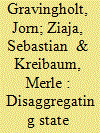| Srl | Item |
| 1 |
ID:
140328


|
|
|
|
|
| Summary/Abstract |
This conceptual and methodological article makes the case for a multidimensional empirical typology of state fragility. It presents a framework that defines fragile statehood as deficiencies in one or more of the core functions of the state: authority, capacity and legitimacy. Unlike available indices of state fragility, it suggests a route towards operationalisation that maintains this multidimensionality. The methodology presented should help in future research to identify clusters of countries that exhibit similar constellations of statehood, whereby ‘constellation’ refers to the specific mix of characteristics across the three dimensions. Such an identification of empirical types would fulfil a demand that exists both in academic research and among policy circles for finding a more realistic model of fragility at an intermediate level between single-case analyses and the far-too-broad category of state fragility.
|
|
|
|
|
|
|
|
|
|
|
|
|
|
|
|
| 2 |
ID:
146925


|
|
|
|
|
| Summary/Abstract |
This article investigates the effect of natural resources on whether ethno-political groups choose to pursue their goals with nonviolent as compared to violent means, distinguishing terrorism from insurgencies. It is hypothesized that whether or not the extraction of fossil fuels sparks violence depends both on the group’s characteristics and the state’s reaction. Data are taken from the Minorities at Risk Organizational Behavior (MAROB) project, covering 118 organizations in 13 countries of the Middle East and North Africa over the 1980–2004 period. The multinomial logit models combine group- and country-specific information and show that ethno-political groups are more likely to resort to rebellion rather than using nonviolent means or becoming terrorists when representing regions rich in oil. This effect is enhanced for groups already enjoying regional autonomy or being supported by a foreign state but can be mitigated by power-sharing arrangements. These results are thus in line with the argument that economic considerations, or ‘greed’, dominate over political considerations, or ‘grievances’, with regard to violent conflicts. The opposite appears to hold considering terrorism, as we do not find any evidence for a resource curse here, but find an increasing effect of political discrimination and a decreasing effect of regional autonomy.
|
|
|
|
|
|
|
|
|
|
|
|
|
|
|
|